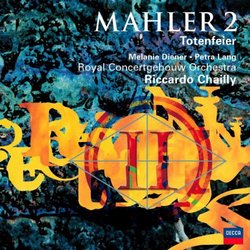| All Artists: Gustav Mahler, Riccardo Chailly, Melanie Diener, Petra Lang, Royal Concertgebouw Orchestra Title: Mahler: Symphony No. 2 & Totenfeier Members Wishing: 0 Total Copies: 0 Label: Decca Import Release Date: 2/4/2002 Album Type: Import Genre: Classical Styles: Forms & Genres, Theatrical, Incidental & Program Music, Historical Periods, Modern, 20th, & 21st Century, Symphonies Number of Discs: 1 SwapaCD Credits: 1 UPC: 028947028321 |
Search - Gustav Mahler, Riccardo Chailly, Melanie Diener :: Mahler: Symphony No. 2 & Totenfeier
 | Gustav Mahler, Riccardo Chailly, Melanie Diener Mahler: Symphony No. 2 & Totenfeier Genre: Classical
Chailly's admirable Mahler 2nd is distinguished by the superb playing of the Concertgebouw, but it's marred by a somewhat opaque recording and by one of the slowest last movements on disc. In itself, the latter is not a fa... more » |
Larger Image |
CD DetailsSynopsis
Amazon.com Chailly's admirable Mahler 2nd is distinguished by the superb playing of the Concertgebouw, but it's marred by a somewhat opaque recording and by one of the slowest last movements on disc. In itself, the latter is not a fatal flaw, merely an idiosyncratic personal touch, which listeners will accept as insightful or reject as a misjudged letdown. Even there, however, numerous passages are done with sensitivity to Mahler's instructions and the soprano-mezzo duet is gorgeous. The characterful scherzo movement is a highlight, as expected from an orchestra whose wind section is second to none. Another highlight is Petra Lang's singing of Urlicht, the fourth movement's song from Youth's Magic Horn, where she's perfection itself. The filler is a welcome oddity, Mahler's Totenfeier (Funeral Rites), an early version of the Symphony's first movement. Chailly's is a provocative, interesting version of a great work that can take many differing viewpoints. --Dan Davis Similarly Requested CDs
|
CD ReviewsChailly continues his outstanding Mahler cycle Bruce Hodges | New York, NY | 04/15/2002 (5 out of 5 stars) "After hearing all of Chailly's Mahler recordings over the last decade, I am convinced that this distinguished conductor's cycle will eventually have its place in history as one of the finest ever. Certainly the caliber of the playing in the series is hard to match; the Concertgebouw Orchestra makes these terribly difficult symphonies sound easy.This new recording displays, again, the sumptuous sound of the orchestra, and Chailly's somewhat analytical, but passionate, way with the composer. A friend described Chailly's recent Mahler Eighth as closer to chamber music, and I suspect the same comment might apply here. Make no mistake: the grandeur of this most heavenly of Mahler symphonies is there, and the choral ending will take your breath away. But in the interim, especially the sarcastic middle movement, there is a transparency and intimacy that may be at odds with the prevailing view of what Mahler "should" sound like. For example, if you like Solti's propulsive Mahler, you probably won't enjoy Chailly's version, which is definitely more relaxed. To some degree, Chailly's slower tempi may reflect his recording venue; the sound decay in the Concertgebouw is longer than in some halls, so a more relaxed tempo pays dividends in avoiding smudging and blurring. However, I also think Chailly wants us to hear every note in this remarkable score, and this clarity - again, something like being able to pinpoint the individual voices in a good string quartet - seems just right. An outstanding version of this piece, although to repeat: it won't be for everyone." An intimate Resurrection?? Yes, and it works! MartinP | Nijmegen, The Netherlands | 04/02/2002 (4 out of 5 stars) "If you prefer your apocalypses outsize and devastating, this disc is not for you. Chailly seems to have developed a penchant for highlighting textual subtleties that does not always suit Mahler. His earliest recordings, of the Tenth, the Sixth and the Seventh were far bolder and more rugged than his more recent Mahler-issues - even the Eight came off as a rather too beautiful (and slow) mystic bel canto opera. And now here is this Second, which has that same uncharacteristic reticence, and yet is very impressive in many ways. All those who love this strange, hybrid work enough to invest in more than one recording I would urge to check it out. Urlicht is especially good. Well, that's an understatement - no matter how familiar it was to me, this rendering literally brought tears to my eyes. Petra Lang sings with incredible purity and utmost simplicity, with hardly any vibrato, and at a true pp as well. The heart-rending, hushed intimacy is greatly enhanced because Chailly (or his engineers) follow Mahler's instruction and place the brass players some distance away at the back of the soundstage. The effect is pure magic, especially with such a peerless brass section as that of the Concertgebouw Orchestra. Where else in the world will you find such mellow sounding trumpets??! This is a nice example of the care Chailly lavishes on realising detailed instructions in the score. Not an accent is missed anywhere, so it seems, nor, happily, a glissando: Chailly isn't afraid to let his strings play real slides, instead of those shamefaced wisps most conductors prefer. Another thing that constantly catches the ear is the audibility of all tones in a chord, and of single instrumental lines (bass clarinet and double bassoon come through splendidly). Unfortunately this does not extend to the percussion, which sounds rather opaque and is in several passages completely swamped by the rest of the orchestra. As a result the final pages are just ever so slightly underwhelming; the Concertgebouw organ might have been given a little help too (though it's realistically recorded as the not-too-powerful instrument it is). Also, given all the care over details, it is surprising to find other instructions regarding tempo or phrasing more than occasionally ignored. E.g., the triplets accompanying the off-stage horns in the Finale are clearly marked 'non legato', yet Chailly has them played very broadly indeed. Tempo's are rather on the slow side, and I found more than one instance where Mahler writes 'drängend' but Chailly slows down. Still, these are minor qualms given the sheer beauty of the playing and singing, and the deeply felt expression in softer passages, which at times verges on the sublime (this recording makes you realise how much of this score is at a pp or sub-pp level). I wouldn't recommend this as an only ('library')version - Bernstein on DG or the unaccountably ignored Kaplan on IMP/Pickwick give you more of the essence of the Resurrection, the vast panorama's and the widescreen drama, with trumpets calling out not from somewhere down the corridor, but from The Beyond itself (although Chailly scrupulously observes all Mahler's indications of distance, with the rumbustious little marching band at fig. 22 drawing near and then crashing into the main orchestra exactly as Mahler must have intended). Kaplan goes to extremes to realise all of Mahler's intentions and doesn't stop short of electronically mixing in cathedral bells in the final bars. Too tacky for some, maybe, but the effect is quite overwhelming and certainly preferable to Chailly's almost inaudible steel sheets. Some things in Mahler simply are in bad taste and ought to be done that way! On the other hand (dear Phil from LA), there is more to Mahler's Second than just sensational sound effects and visceral excitement. Those who are interested in its subtler side, or generally prefer their Mahler 'Salonfähig', need not hesitate over this new recording." Sumptuous Mahler from Chailly and the Concertgebouw John Kwok | New York, NY USA | 01/02/2003 (5 out of 5 stars) "Chailly's latest recording of a Mahler symphony truly is in a class by itself; without question it is the best recent recording of Mahler's 2nd Symphony. Here he does a splendid job with the Royal Concertgebouw Orchestra in yielding a vibrant, brilliant interpretation that should be commended for his skill in gently emphasizing every phrase, as though this work was a piece composed for a chamber orchestra. The soloists, especially Petra Lang, are strongly commended for their exquisite phrasing. Unfortunately, Decca's recording sounds a bit opaque at times, so their voices tend to be muddled with the sounds of the orchestra. Personally, I prefer either Abbado's or Bernstein's interpretations for a modern version of this work, yet Chailly has certainly established himself here as a fine interpreter of Mahler. The recording closes with the Totenfeier, an early version of the 2nd Symphony's first movement."
|

 Track Listings (2) - Disc #1
Track Listings (2) - Disc #1







